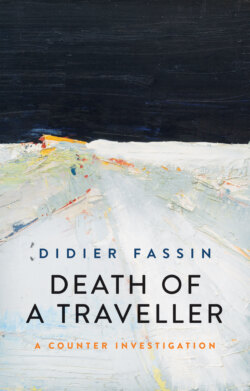Death of a Traveller

Реклама. ООО «ЛитРес», ИНН: 7719571260.
Оглавление
Didier Fassin. Death of a Traveller
CONTENTS
Guide
Pages
Death of a Traveller. A Counter-Investigation
Dedication
Acknowledgments
A Simple Story Preface to the English Edition
Terminological Note
Preamble
Prologue
I The Father
II The First Officer
III The Mother
IV The Second Officer
V The Doctor
VI The Sister
VII The Prosecutor
VIII The Journalist
IX Dignity
X Campaign
XI Mourning
XII Biography
XIII Investigation
XIV Dismissal
XV Truth
XVI Lies
XVII Reconstruction
XVIII That Day
Epilogue
POLITY END USER LICENSE AGREEMENT
Отрывок из книги
Didier Fassin
Translated by Rachel Gomme
.....
What fascinated Foucault and his fellow researchers in the story of Pierre Rivière was the process of veridiction at work, among the doctors, judges and the murderer himself, in a case that combined crime and madness, criminal responsibility and mental health. What drove Capote’s investigation and Ginzburg’s counter-investigation was the possibility of drawing out a truth, in the first case through literature, in the second in the name of justice. These, then, are two distinct projects with regard to the question of truth-telling: for Foucault and his colleagues it is the interplay of utterances of truth that interests them; for Capote and Ginzburg it is the truth itself that is at stake. The present book moves progressively from the former to the latter, from the operation of veridiction toward the search for truth. This truth, which I have called ethnographic truth, is independent of the relations of power and knowledge underlying the production of judicial truth. It has no argument to make apart from the fact that it arises out of the twofold decision to give all accounts the same credit and to rely solely on assessment of the evidence. Deliberately limited in its ambition, this version, unlike the judicial truth, has no bearing on recognition of the guilt or innocence of those accused. But it has weight for those to whom truth is habitually denied, for it restores some part of their dignity and even offers them a glimpse of the hope of justice. While it has no impact in the courts, it partakes of an ethical concern.
This concern is a live one. It articulates a matter of urgency. While the death of men in interactions with the police is a frequent occurrence generally fostered by the exoneration of the alleged perpetrators, it is rare to have access to all the evidence in one of these cases, and even exceptional when the case has been dismissed because it is then subject to judicial confidentiality, breach of which is punishable in France by one year’s imprisonment and a fine of €15,000. Having been granted authorization to consult the documents in the case concerning Angelo’s death, I have therefore felt an obligation to put this privilege to good use by seeing this work through. Apart from the singularity of the case, starting with the fact that it concerns a Traveller, with all the marginality, suspicion and ostracism implied by that identity, it seemed to me that, both in the method of intervention chosen to effect the young man’s arrest and in the logic of the judicial process that culminated in the absolution of the two men who fired the fatal shots, there were a number of features that could be identified or inferred in many other cases throughout the world. The details of these cases may vary, but they are tragically alike in their dénouement: the loss of a life and the impunity of those responsible. In this respect the simple story of the death of Angelo, extended through his sister’s fight for justice and truth, acquires if not a universal then at least an exemplary significance.
.....